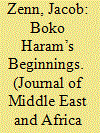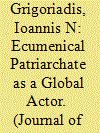|
|
|
Sort Order |
|
|
|
Items / Page
|
|
|
|
|
|
|
| Srl | Item |
| 1 |
ID:
190738


|
|
|
|
|
| Summary/Abstract |
This article centers on the Guantánamo detainee assessment of diaspora Nigerian jihadist in Saudi Arabia, Umran Bakr Muhammad Hausawi (Umran), which has never been cited previously in literature on Boko Haram. Through analyzing this detainee assessment alongside Boko Haram founding members’ interviews, al-Qaeda publications about Boko Haram’s founders, media reports contemporaneous with Boko Haram’s founding, US leaked and declassified intelligence documents about Nigeria during Boko Haram’s founding period, and Nigerian salafis’ firsthand accounts of Boko Haram’s founders, this study argues that diaspora Nigerians in Saudi Arabia introduced jihadism to Nigeria along with an Algerian jihadist operating in Nigeria in 1994. Moreover, Umran’s detainee assessment and corroborative sources demonstrate Saudi, US, and Nigerian intelligence officials monitored jihadists from Nigeria’s diaspora in Saudi Arabia before Boko Haram’s founding in 2002 and first confrontations with Nigerian security forces in 2003. This work also affirms that Boko Haram’s “originator,” Muhammed Ali, was a diaspora Nigerian jihadist in Saudi Arabia and received funding through Umran, Umran’s brother Umar, and Usama bin Laden’s Yemeni envoy, who all operated between Nigeria and Afghanistan before 9/11 on Bin Laden’s directives. Further, the jihadist from Nigeria’s diaspora in Saudi Arabia who succeeded the Yemeni envoy, Ibrahim Harun, knew Umran, Umar, and their other brother who joined al-Qaeda with Umar around 1995. This was eight years before Harun traveled from Pakistan to Nigeria on an al-Qaeda mission. This research supports the emerging literature that argues that studies of Boko Haram’s evolution from 2004 under Ali’s successor, Boko Haram “founder” Muhammed Yusuf, must consider the intense intelligence pressure that jihadists experienced in Nigeria after 1995, which Yusuf sought to avoid, and which affected Yusuf’s preaching and preparation for the jihad he eventually launched in 2009. The article further contributes to the literature on transnational, salafi-jihadist currents throughout the Muslim world and the Nigerian diaspora.
|
|
|
|
|
|
|
|
|
|
|
|
|
|
|
|
| 2 |
ID:
190741


|
|
|
|
|
| Summary/Abstract |
Following the demise of the Ottoman Empire and the advent of republican Turkey, the Ecumenical Patriarchate has struggled to maintain its existence and its ecumenical role, despite the obstacles that the Republic of Turkey has set before it. Yet, challenges have abounded within the Orthodox world as well. The Patriarchate has viewed Russian involvement in Orthodox ecclesiastical affairs with suspicion, if not outright opposition. This is like its former stance regarding Russian involvement in Orthodox religious affairs in the Balkans and the Middle East throughout the nineteenth century. This competition has been rekindled since the end of the Cold War, as the Patriarchate has grown in importance as a global actor. The Ukrainian ecclesiastical crisis, which brought the Ecumenical Patriarchate and the Moscow Patriarchate to loggerheads, provides an additional opportunity to measure the extent of Russian influence on the Orthodox Church. This article explores the history of the Ecumenical Patriarchate in the republican Turkish era and the challenges it has faced. It also examines the dynamics that have developed since the end of the Cold War in its relations with Russia and Turkey through its confrontation with the Moscow Patriarchate particularly in light of the Ukrainian ecclesiastical crisis. This study aspires to shed light on the extent of Russian influence on Orthodox ecclesiastical affairs and explore the role of the Ecumenical Patriarchate in the global era
|
|
|
|
|
|
|
|
|
|
|
|
|
|
|
|
| 3 |
ID:
190739


|
|
|
|
|
| Summary/Abstract |
This work examines some recent developments and transformations in the Islamist discourse in Morocco. The emphasis is laid on how sharīʿa, or Islamic law, is redefined within an objective-based outlook to fit with what this article argues to be a symptom of post-Islamism. Central to these developments is the abandonment of establishing a khilāfah, “caliphate” or an Islamic state, as the main purpose for which Islamism has toiled to achieve since its inception. The article argues that the metamorphoses of Islamism in Morocco are not necessitated by some ephemeral political exigencies exclusively, but rather they reflect a paradigm shift in the ideology underpinning the Islamist discourse. To explore the aspects and implications of this shift, the article focuses on some recent works of two Islamic leaders: Ahmad al-Raysuni and his reformulation of Islamic law based on an emasculated utilitarianism and Saadeddine Othmani in his attempt to lay down theoretical and legal foundations for a silent religious secularity
|
|
|
|
|
|
|
|
|
|
|
|
|
|
|
|
| 4 |
ID:
190740


|
|
|
|
|
| Summary/Abstract |
In July 1986, a dramatic top-secret meeting of the Baʿth Pan Arab Leadership, the party’s highest ideological body, fully recorded by Ṣaddām Ḥussein, took place in wartime Baghdad. This meeting is thrice unique. First, the medium, an unabridged, audio-recording. Second, the topic, the dilemma of many Middle Eastern ruling regimes, vacillating between a secular, or semi-secular ideology and Islamic political expediency. In the case of the Baʿth, a more secular and ideological movement than most, this dilemma is particularly poignant. Third, it is exposing a bitter clash between a brutal dictator, who had executed comrades for opposing him, and three brave lieutenants. On the surface it was convened to discuss a tactical alliance with a sworn enemy, the Muslim Brethren (MB). At a dangerous moment in the Iraq-Iran War, Ṣaddām identified swelling popular religiosity. He hoped that an alliance with the MB would blunt criticism of his regime’s secularism. All the same, some participants feared that secular Arabism, the central tenet of Baʿthi faith, was at stake. Unexpectedly, the meeting produced a startling drama. Albeit temporarily, it forced Ṣaddām to take one step back. Other ideologically oriented dictators, such as Vladimir Lenin, Joseph Stalin, Ḥāfiẓ al-Assad, and the Ayatollah Khomeini, too, faced ideology-politics dilemmas, yet none of them left such a surprising chronicle. A similar audio recording also comes to mind that offers a rare verbatim meeting of the inner working of a county’s highest institution at a moment of crisis – the transcripts of Kennedy’s ExComm during the Cuban Missile Crisis. While it deliberated an existential global matter and took place in a democracy, one sees similarities, namely, its detail, the exposure of emotional charges, the ability to speak truth to power, and the benefit resulting from that ability.
|
|
|
|
|
|
|
|
|
|
|
|
|
|
|
|
| 5 |
ID:
190737


|
|
|
|
|
| Summary/Abstract |
Despite a burgeoning interest in studying the effects that traditional leaders have on service delivery and political accountability, scholars have paid little attention to political competition and its role in accountability for the unelected leaders. This article investigates these questions leveraging original surveys collected from 684 village-level traditional leaders (658 for the second round), 680 members of their ruling family, and 669 secretaries of the leaders in Central Malawi. This study first establishes that leadership contestation appeared in 14 percent of the leadership positions, which challenges the conventional belief that such disputes occur who exceptionally rarely for such hereditary positions. The in-depth analyses in this article demonstrate that traditional leaders’ legitimacy stems from the support from their ruling family, and that the family wields significant power in the installation and removal of the leader as selectors. This work further finds that traditional leaders who experienced competitive challenges exhibit a higher propensity to share the resources at their disposal with their ruling family than other leaders who did not encounter the challenges. The findings align with the theoretical expectation that leaders who undergo competitive challenges adopt a heightened sense of the importance of the ruling family and are incentivized to buy their loyalty because securing this support or the lack thereof significantly affects the leaders’ fate and authority. Finally, this article expands on the recent studies concerning competition in traditional leadership by shifting the focus to the ruling family – the kingmakers behind the scenes – and discusses the ramifications of this phenomenon on political accountability.
|
|
|
|
|
|
|
|
|
|
|
|
|
|
|
|
|
|
|
|
|